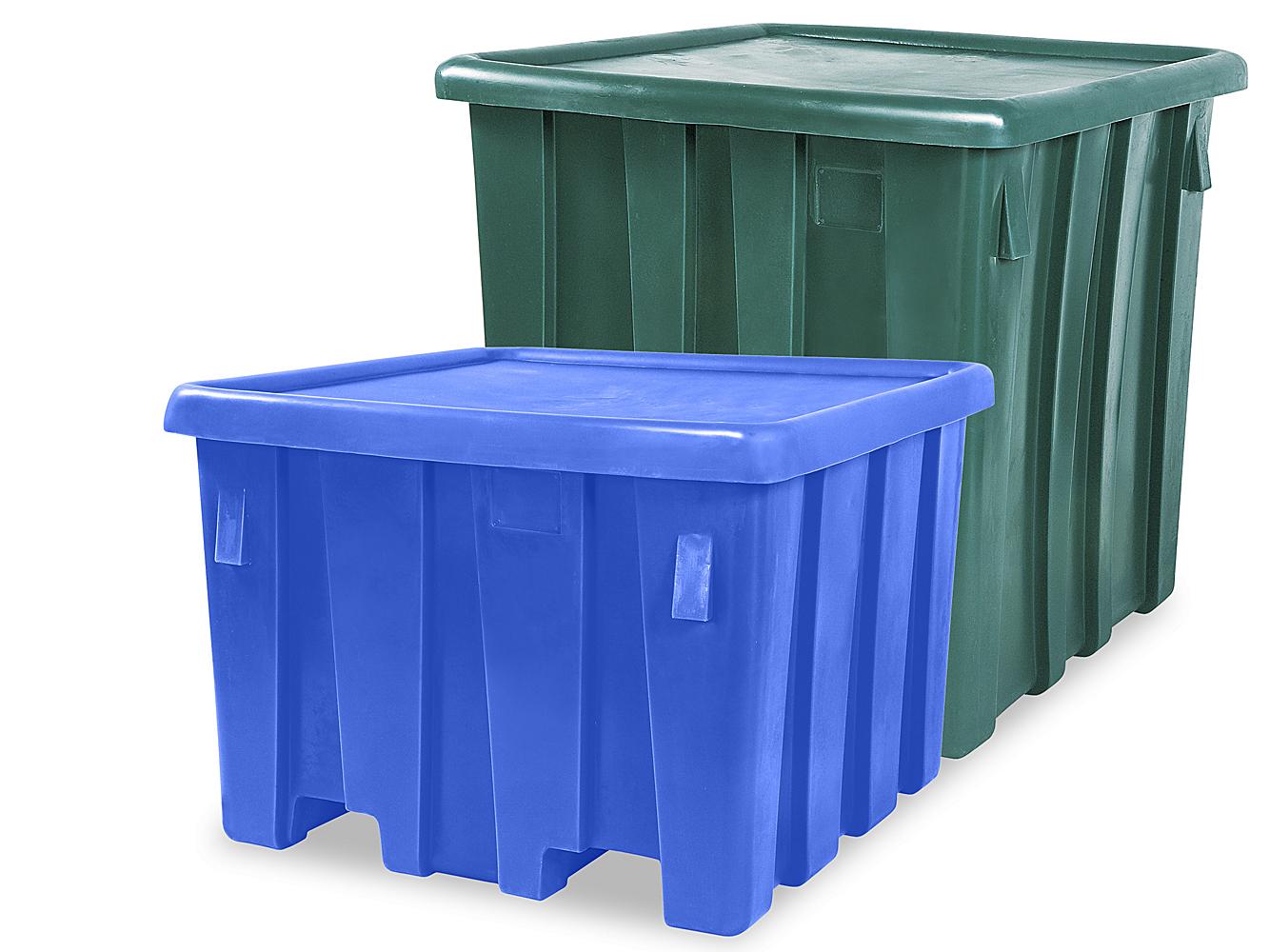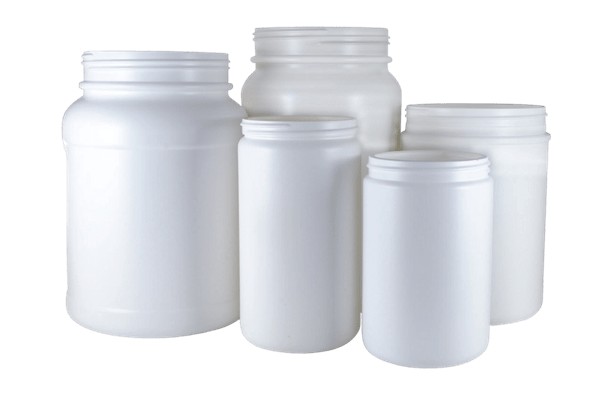The Role of Bulk Plastic Containers in Effective Recycling Practices and Sustainability
Bulk plastic containers are integral to contemporary recycling efforts. Their style enhances the performance of product collection and transportation, adding to sustainability objectives. These containers not only optimize area yet additionally aid in monitoring contamination degrees. Their implementation is not without obstacles. Understanding the full scope of their impact reveals a complex connection in between logistics and environmental duty that calls for more expedition.
Comprehending Bulk Plastic Containers
Mass plastic containers function as a crucial element in numerous industries, assisting in the storage and transportation of products. These containers are usually made from robust materials such as high-density polyethylene (HDPE) or polypropylene, which give sturdiness and resistance to environmental aspects. Their design commonly includes features like stackability and modularity, permitting for effective use of space throughout both storage and transportation.
Industries such as farming, food processing, and making often utilize bulk plastic containers as a result of their lightweight nature and convenience of handling. The containers can be found in different dimensions and setups, accommodating the certain needs of various items. Their versatility expands beyond plain performance; they can additionally be tailored with lids, takes care of, and identifying options to boost functionality - plastic bulk containers. Consequently, mass plastic containers play a crucial duty in optimizing logistics and supply chain procedures throughout multiple fields, thus adding to total efficiency and cost-effectiveness
Benefits of Using Bulk Plastic Containers in Recycling
The utilization of mass plastic containers substantially enhances the efficiency of the process when companies prioritize reusing efforts. These containers are designed to enhance room, permitting the storage and transportation of larger quantities of recyclable products. This causes less journeys to reusing facilities, therefore decreasing gas consumption and linked exhausts.
Additionally, bulk plastic containers are immune and sturdy to numerous environmental elements, guaranteeing that products continue to be protected throughout handling and transportation. Their light-weight style even more adds to lower transportation costs.
Moreover, the harmony of these containers promotes much better sorting and processing of recyclable materials, which can enhance total recycling prices - Bulk Plastic Containers. Organizations that embrace bulk plastic containers likewise show a commitment to sustainability, favorably affecting their brand name image. Eventually, these benefits not just improve reusing methods however additionally add to wider ecological objectives
Exactly How Bulk Plastic Containers Facilitate Material Collection
Effective product collection is greatly improved by the use mass plastic containers, as they provide a structured and efficient service for gathering recyclable things. These containers are made to fit huge volumes of materials, which streamlines the sorting and storage space procedure. Their stackable style maximizes space use, making it less complicated for centers to arrange recyclables without mess.
In enhancement, bulk plastic containers are weather-resistant and durable, enabling outside positioning without degradation. This durability ensures that materials continue to be secured till they are collected for processing.

The uniformity in dimension and shape of these containers promotes standardization throughout collection points, making it possible for better tracking of recyclable quantities. Additionally, their clear nature permits very easy exposure of components, assisting in the monitoring of contamination levels and assuring that just ideal materials are accumulated. Overall, bulk plastic containers play an important role in streamlining the material collection process, therefore advertising reliable reusing methods.
Transportation Efficiency and Environmental Impact
Transportation efficiency plays an essential duty in the reusing process, particularly through the optimization of lots ability in bulk plastic containers. By taking full advantage of the quantity of material transferred, companies can significantly reduce the variety of trips called for, therefore lessening their carbon impact. This approach not just enhances functional performance however additionally contributes to extra sustainable environmental methods.

Enhancing Tons Capacity
Although enhancing tons capacity is commonly forgotten, it plays an important duty in enhancing transportation effectiveness and minimizing ecological impact in reusing practices. By maximizing the volume that mass plastic containers can hold, recycling procedures can minimize the variety of journeys needed for transportation. This not only reduces fuel usage yet likewise lowers the wear and tear on automobiles. Efficient tons administration permits facilities to use area properly, making certain that each transportation cycle is as effective as feasible. Furthermore, well-optimized lots can result in far better arrangements with logistics carriers, possibly decreasing general prices. Inevitably, boosting lots capability adds to a more lasting reusing system by promoting effective resource usage and reducing waste generated throughout transport.
Decreasing Carbon Impact
As recycling procedures venture to minimize their environmental influence, lowering the carbon footprint related to transportation becomes an essential objective. Bulk plastic containers play an important duty in attaining this goal by enhancing lots efficiency and optimizing logistics. Their lightweight yet sturdy layout permits optimum freight area use, reducing the number of journeys called for to carry products. By combining shipments, recycling facilities can decrease gas consumption and greenhouse gas discharges. In enhancement, strategically situating recycling centers lessens transport ranges, in addition decreasing carbon outputs. Employing fuel-efficient lorries and alternate power sources improves overall sustainability. By incorporating these methods, the recycling industry can significantly decrease its carbon footprint, contributing to a much more lasting future.
Challenges in the Usage of Bulk Plastic Containers

Contamination Issues
Contamination concerns stand for a significant difficulty in the reliable use of mass plastic containers within recycling methods. These containers often build up residues from previous see this website components, causing combined products that can impede the reusing process. Pollutants such as food waste, chemicals, or non-recyclable products can jeopardize the honesty of the whole batch, causing raised disposal expenses and lowered recycling prices. In addition, improper cleansing or sorting can worsen these problems, making it hard for recycling facilities to process materials effectively. The visibility of contaminants not just impacts the high quality of recycled items but likewise threatens the overall sustainability initiatives aimed at reducing plastic waste. Attending to these contamination challenges is critical for boosting the effectiveness of bulk plastic container recycling.
Recycling Facilities Limitations
Ineffectiveness in reusing infrastructure presents substantial obstacles for the effective monitoring of bulk plastic containers. Lots of recycling centers lack the capability to refine large quantities of these containers efficiently, resulting in increased prices and hold-ups. Inadequate sorting modern technologies usually lead to contamination, as bulk containers might be mixed with various other materials, complicating the reusing procedure. Restricted transportation choices likewise prevent the movement of bulk plastic containers to ideal recycling centers, causing raised landfill waste. In addition, an absence of standard protocols for mass container reusing creates confusion among companies and consumers, additionally complicating efforts to advertise sustainability. Attending to these infrastructure restrictions is vital to improve reusing practices and make the most of the potential of mass plastic containers in a circular economic situation.
Ideal Practices for Carrying Out Bulk Plastic Containers
When organizations consider carrying out bulk plastic containers in their reusing methods, they must prioritize a tactical approach that improves efficiency and reduces contamination risks. First, selecting the ideal container dimension and type is vital to fit the quantity of products being refined. Organizations needs to likewise establish clear labeling and signage to lead users on proper check out here disposal approaches, minimizing complication and errors. Regular training sessions for staff can even more strengthen these methods, guaranteeing everyone understands their functions in maintaining reusing stability.
Furthermore, companies must execute a regular upkeep timetable to inspect and clean containers, preventing the build-up of impurities. Partnering with neighborhood reusing facilities can likewise streamline the collection process, making sure that materials are successfully processed. Finally, organizations should check and assess their reusing metrics, using this information to refine methods with time and promote continual renovation in their sustainability initiatives.
The Future of Bulk Plastic Containers in Sustainable Practices
As companies increasingly focus on sustainability, the duty of mass plastic containers in recycling practices is established to develop significantly. Developments in products science are leading to the growth of biodegradable and recyclable alternatives, enhancing the ecological advantages of mass plastic containers. In addition, the application of closed-loop systems will certainly permit easier collection and repurposing of these containers, lowering waste and source intake.
Technical improvements, such as wise radar, will certainly allow business to check the lifecycle of mass containers, improving efficiency in reusing procedures. As consumer demand for lasting methods grows, organizations will likely take on mass plastic containers designed for reuse and lasting value. Collaboration in between markets and federal governments will foster the establishment of standard reusing methods, ensuring that mass containers are successfully integrated right into broader sustainability initiatives. In general, the future of bulk plastic containers shows up promising, with significant possibility for adding to a round economy.
Frequently Asked Concerns
Exactly How Are Mass Plastic Containers Made and What Products Are Used?
Bulk plastic containers are typically made from high-density polyethylene (HDPE) or polypropylene (PP) These materials are processed via injection molding or impact molding methods, causing long lasting, light-weight containers suitable for different storage and transportation demands.
Can Bulk Plastic Containers Be Reused Multiple Times Before Recycling?
Yes, bulk plastic containers can be reused several times before recycling. Their durability and layout enable for duplicated use in numerous applications, advertising sustainability and source efficiency while lowering the need for brand-new containers.

What Certifications Exist for Mass Plastic Containers in Recycling?
Numerous certifications for bulk plastic containers consist of the Recycling Partnership's accreditation, the Cradle to Cradle Licensed ™ standard, and the Lasting Packaging Union's guidelines, ensuring containers fulfill particular environmental and recyclability criteria for reliable recycling.
Just How Do Bulk Plastic Containers Compare to Other Recycling Storage Options?
Mass plastic containers supply higher longevity and ability compared to other recycling storage space options, reducing the danger of contamination and assisting in efficient transportation. Their layout supports better organization, boosting overall effectiveness in reusing operations.
What Is the Life expectancy of a Bulk Plastic Container in Recycling Processes?
The lifespan of a bulk plastic container in recycling procedures generally ranges from 5 to 10 years, depending upon use, material quality, and ecological conditions, enabling for multiple cycles of use prior to ultimate disposal or recycling.
When organizations prioritize recycling initiatives, the application of mass plastic containers significantly boosts the effectiveness of the process. Transportation effectiveness my response plays an essential function in the reusing procedure, especially via the optimization of load capacity in bulk plastic containers. The use of mass plastic containers in reusing practices encounters substantial challenges, especially worrying contamination concerns and constraints within recycling facilities. Contamination concerns stand for a substantial difficulty in the efficient usage of mass plastic containers within reusing practices. When organizations think about executing bulk plastic containers in their reusing methods, they must prioritize a tactical method that enhances efficiency and reduces contamination dangers.